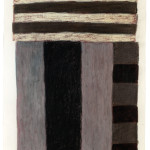Biography
Sean Scully was born in Ireland in 1945 and grew up in London. He studied painting at Croydon College of Art from 1965–67 and at the University of Newcastle upon Tyne from 1967–71. In 1972 Scully was awarded a Knox Fellowship to study art at Harvard University, and in 1975, based on the merit of his early paintings, Sully won a Harkness Fellowship, which allowed him to move permanently to New York. Scully’s art is composed of geometric shapes, primarily rectangles, arranged on horizontal and vertical axes evoking architectural forms. In its harmony and spirituality, his paintings recall the traditions of early European modernism, particularly the work of Henri Matisse and Piet Mondrian, and in mood and open-ended composition, Pollock’s and Rothko’s versions of abstract expressionism. Scully’s work reconciles European order with American vigor, or more specifically, how to combine Mondrian’s clarity with Matisse’s sensuousness, Pollock’s rhythm, and Rothko’s fluidity, a question to which he gives slightly different answers with each completed work.
In the tradition of Matisse and Rothko, Scully uses a variety of color palettes ranging from black and rich hues of brown and red, to vibrant colors such as pink, canary yellow, and azure blue. Each color scheme represents a different group of paintings and stage of development in Scully’s artistic career. Scully continues to investigate and elaborate on various geometric forms in different media: for example, oil, pastel, or watercolor compositions focusing on stripes.
From 1977–1983, Scully taught at Princeton University and in 1983 established his own studio in New York, and he has other studios in Germany, England, and Spain. With his subtle and diverse color combinations and strong compositional constructions, Scully continues as a highly regarded contemporary artist. Scully’s works are collected by many museums around the world.

 Untitled
Untitled